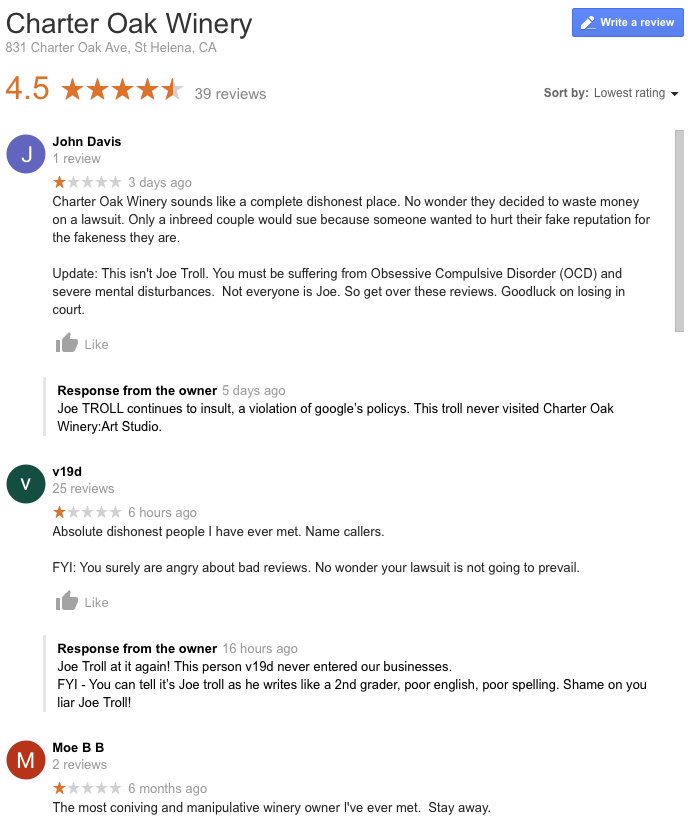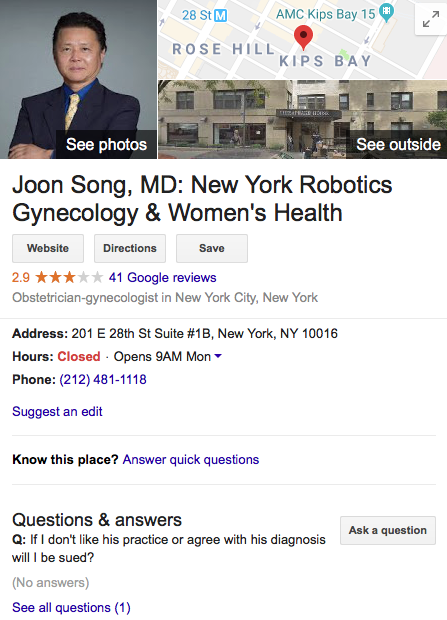Several weeks ago two businesses were in the news having started lawsuits in regards to reviews. In one case, the suit makes all kinds of sense, even though they might lose. In the other, it makes little sense even though they might win.
Situation One – A small winery in California is suing Google in small claims court over “fake reviews”
The facts:
Layla Farucci, the owner of Charter Oaks Winery and art studio in Napa Valley, claims that a number of reviews on her Google listing are from a single user and make personal attacks on her rather than evaluate the business.
Farucci has asked Google to take down the reviews, while some to have been taken down others remain and new ones are appearing. “As an owner I think that Google should listen to me, and they won’t.”
According to the news report one of the reviews called the winery a “toilet,” while others described the wine as “rubbery” and the staff as “manipulative, calculating and pompous.” Those seem gone but new ones have appeared noting the owner’s dishonesty.
Layla is thus suing Google in small claims court.
The relevant laws & legal standards:
The defining legal standard is set by federal statute Section 230 of the Communications Decency Act that states that “No provider or user of an interactive computer service shall be treated as the publisher or speaker of any information provided by another information content provider” (47 U.S.C. § 230).
Section 230 categorically protects Google and any online company hosting user generated content. The EFF notes that “In other words, online intermediaries that host or republish speech are protected against a range of laws that might otherwise be used to hold them legally responsible for what others say and do”.
Even if the content is factually wrong, defamatory or a lie, Google has no obligation for the legality or impact of that content. If the content is proven to be defamatory, in a court of law, Google does not have to remove it although in practice they do.
The Likely Outcome:
Thus under federal statute, which trumps any local or state rules in cases like these, Charter Oaks Winery’s case against Google will likely lose. It is a small claims court where lawyers are often not present so the outcome is more unpredictable but it is extremely unlikely that Charter Oaks could see any redress.
Unless the judge is totally out of touch with the law, Charter Oaks will lose this case.
Was it a Good Business Decision?:
And yet in this situation I think that the business will actually benefit from having brought this case. Because they are in a small claims court and have no need of a lawyer, their expenses will be minimal.
The publicity the Winery receives in news reports and across the internet will provide both SEO and reputation value to the business. Who after all is in favor of fake reviews and every small business that reads the story is cheering them on. And who doesn’t like a good David and Goliath story no matter how unlikely victory.
If you search “winery sues google over bad reviews” on Google you will find over 30 mentions of the business on national sites as prominent as CBS News and MSN, local news sources like the Napa Valley Register and wine industry sites like WineBusiness.com and Wine Industry Insight.
The cost of filing a claim in small claims court in Napa County is $75 or less depending on the value of the suit. It probably took the owner an hour to fill out the paperwork. The return on that investment from an SEO point of view (I actually once recommended this to a client as a tactic) will prove to be very high and if anything, on the reputation front, Charter Oaks will be a hero to other small businesses and wineries.
Their hearing is soon so we should see soon what happens. If nothing else Charter is likely to get more news coverage.
A win even though they will most likely lose their court case.
Situation Two – A Doctor sues a patient for negative Yelp review
The facts:
In July of last year, Michelle Levine had a negative experience in visiting a new gynecologist. She wrote a scathing Yelp review and a 1 star review on Facebook after complaining to the office about improper billings that were not resolved. In the “lengthy critical review said, ‘very poor and crooked business practice,’ among other things”.
In August Dr. Joon Song flied a suit for defamation and Levine removed her reviews. The suit apparently is moving forward and the defendant recently created a GoFundMe campaign to raise money for her defense and started speaking to the press to raise awareness of her plight.
The relevant laws and legal standards:
Generally speaking reviews are considered speech and are protected under the first amendment. There are however limits on free speech and the right is not absolute. In NY State one of the conditions that might make a review not protected speech is defamation.
In a similar case that occurred in NY State in 2015, a Staten Island woman was ordered to pay $1,000 in damages for claiming in her review that the person involved for the vendor was “a liar and a con artist”.
The Likely Outcome:
In cases like this there are no likely outcomes. It could go either way. The right to free speech is not absolute and Levine, by generalizing her experience and referring to ‘very poor and crooked business practice,’ may have moved into an unprotected area and could lose this case.
Was it a Good Business Decision?:
The business receiving the bad review has hired a lawyer and has incurred considerable expense in moving the case forward. Once Levine removed the reviews, the doctor and his lawyer should have called it a victory and moved on. They didn’t.
From where I sit, this was a terrible decision on the part of the business to continue to pursue this case. Whether for ego or self righteousness he has brought incredible notoriety to his business and his practices. His reviews, not great to start with, have tanked and folks have even taken to Google Q & A to criticize him. His billing practices have become a target for other reviewers more circumpsect about his motive and will dog him for a long time.
From where I sit, it’s a loss even if the business wins in court. And it’s a loss that will have economic impact long after the case has been settled.
You can’t win for losing as they say.
Reviews often bring out the best AND the worst in both businesses and people. They somehow capture the worst part of our nature whether that be pettiness or revenge. The problem is that they move from the cloud to a court of law where things get much messier. Buckle in, the (review) ride is bound to get crazier and more amazing than ever.


